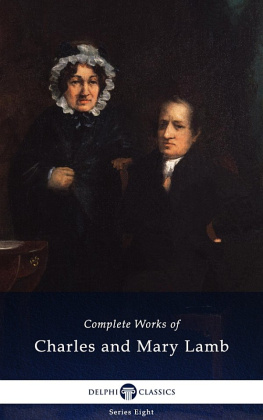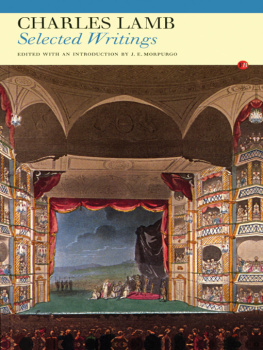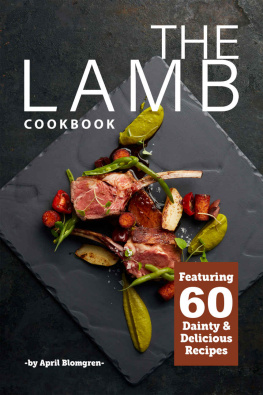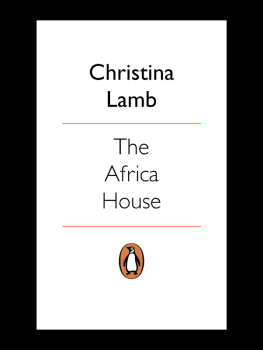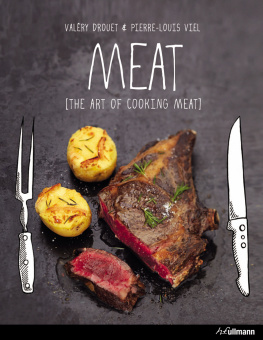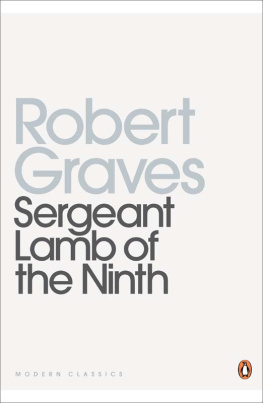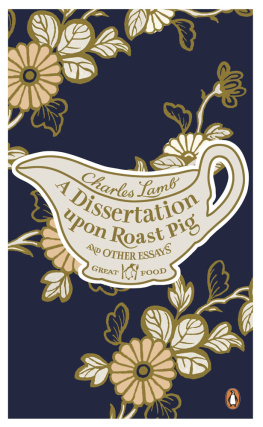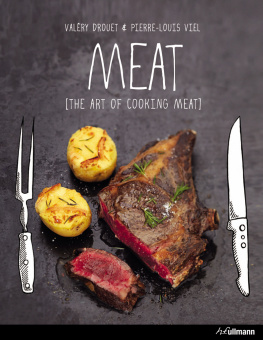Charles Lamb - The Essays of Elia
Here you can read online Charles Lamb - The Essays of Elia full text of the book (entire story) in english for free. Download pdf and epub, get meaning, cover and reviews about this ebook. year: 2011, publisher: Barnes & Noble, genre: Detective and thriller. Description of the work, (preface) as well as reviews are available. Best literature library LitArk.com created for fans of good reading and offers a wide selection of genres:
Romance novel
Science fiction
Adventure
Detective
Science
History
Home and family
Prose
Art
Politics
Computer
Non-fiction
Religion
Business
Children
Humor
Choose a favorite category and find really read worthwhile books. Enjoy immersion in the world of imagination, feel the emotions of the characters or learn something new for yourself, make an fascinating discovery.
- Book:The Essays of Elia
- Author:
- Publisher:Barnes & Noble
- Genre:
- Year:2011
- Rating:5 / 5
- Favourites:Add to favourites
- Your mark:
- 100
- 1
- 2
- 3
- 4
- 5
The Essays of Elia: summary, description and annotation
We offer to read an annotation, description, summary or preface (depends on what the author of the book "The Essays of Elia" wrote himself). If you haven't found the necessary information about the book — write in the comments, we will try to find it.
Published in 1823, this collection of witty and conversational essays from The London Magazine includes Dream-Children, The South-Sea House, and Grace Before Meat, all amply testifying to the qualities that have established Lamb as among the finest of British essayists. And who could forget Lambs A Dissertation Upon Roast Pig...
The Essays of Elia — read online for free the complete book (whole text) full work
Below is the text of the book, divided by pages. System saving the place of the last page read, allows you to conveniently read the book "The Essays of Elia" online for free, without having to search again every time where you left off. Put a bookmark, and you can go to the page where you finished reading at any time.
Font size:
Interval:
Bookmark:
CHARLES LAMB

This 2011 edition published by Barnes & Noble, Inc.
All rights reserved. No part of this publication may be reproduced, stored in a retrieval system, or transmitted, in any form or by any means, electronic, mechanical, photocopying, recording, or otherwise, without prior written permission from the publisher.
Barnes & Noble, Inc.
122 Fifth Avenue
New York, NY 10011
ISBN: 978-1-4114-3588-9
INTRODUCTION
T HE two volumes of miscellaneous writings by Charles Lamb, published by the Olliers in 1818, contained a variety of prose sufficient to prove once more that the study and practice of verse is one of the best trainings for a prose style. In his dedication of the poetical volume to Coleridge, Lamb half apologises for having forsaken his old calling, and for having "dwindled into prose and criticism." The apology, as I have elsewhere remarked, was hardly needed. If we except the lines to Hester Savary and a few of the sonnets and shorter pieces, there was little in the volume to weigh against the two essays on Hogarth and the tragedies of Shakespeare. It was the result of the miscellaneous and yet thorough character of Lamb's reading from a boy that the critical side of his mind was the first to mature. The shorter papers contributed by Lamb to Leigh Hunt's Reflector in 1811the year to which belong the two critical essays just mentionedmore or less framed on the model of the Tatler and its successors, give by comparison little promise of the richness and variety of the Elia series of ten years later. On the other hand, there are passages in the critical essays, such as that on Lear, as represented on the stage, and the vindication of Hogarth as a moral teacher, which represent Lamb at his highest.
On the republication of these miscellanies in 1818, it could not be overlooked that a prose writer of something like genius was coming to the front. One of the younger critics of the day, Henry Nelson Coleridge, reviewing the volumes in the fifth number of the Etonian, in 1821, does not hesitate to declare that "Charles Lamb writes the best, the purest, and most genuine English of any man living," and adds the following acute remark:"For genuine Anglicism, which amongst all other essentials of excellence in our native literature, is now recovering itself from the leaden mace of the Rambler, he is quite a study; his prose is absolutely perfect, it conveys thought, without smothering it in blankets." Lamb was indeed to do more than any man of his time to remove the Johnsonian incubus from our periodical literature. But the full scope of the writer's powers was not known, perhaps even to himself, till the opportunity afforded him by the establishment of the London Magazine in 1820. It did credit to the discernment of the editors of that publication, that no control seems to have been exercised over the matter or manner of Lamb's contributions. The writer had not to see all that made the individuality of his style disappear under the editor's hand, as his review of the Excursion in the Quarterly had suffered under Gifford's. To "wander at its own sweet will" was the first necessity of Lamb's genius. And this miscellaneousness of subject and treatment is the first surprise and delight felt by the reader of Lamb. It seems as if the choice of subject came to him almost at haphazard,as if, like Shakespeare, he found the first plot that came to hand suitable, because the hand that was to deal with it was absolutely secure of its power to transmute the most unpromising material into gold. Roast Pig, The Praise of Chimney-Sweepers, A Bachelor's Complaint of the Conduct of Married People, Grace before Meatthe incongruity of the titles at once declares the humorist's confidence in the certainty of his touch. To have been commonplace on such topics would have been certain failure.
In the Character of the late Elia, by a Friend, which Lamb wrote in the interval between the publication, of the first and second series of essays, he hits off the characteristics of his style in a tone half contemptuous, half apologetic, which yet contains a criticism of real value. "I am now at liberty to confess," he writes, "that much which I have heard objected to my late friend's writings was well founded. Crude, they are, I grant youa sort of unlicked, incondite thingsvillainously pranked in an affected array of antique words and phrases. They had not been his, if they had been other than such; and better it is that a writer should be natural in a self-pleasing quaintness than to affect a naturalness (so called) that should be strange to him." No better text could be found from which to discourse on Charles Lamb's English. The plea put forth almost as a paradox is nevertheless a simple truth. What appears to the hasty reader artificial in Lamb's style was natural to him. For in this matter of style he was the product of his reading, and from a child his reading had lain in the dramatists, and generally in the great imaginative writers of the sixteenth and seventeenth centuries. Shakespeare and Milton he knew almost by heart: Beaumont and Fletcher, Massinger, Ford, and Webster, were hardly less familiar to him; and next to these, the writers of the so-called metaphysical school, the later developments of the Euphuistic fashion, had the strongest fascination for him. Where the Fantastic vein took the pedantic-humorous shape, as in Burton; or the metaphysical-humorous, as in Sir Thomas Browne; or where it was combined with true poetic sensibility, as in Wither and Marvell,of these springs Lamb had drunk so deeply that his mind was saturated with them. His own nature became "subdued to what it worked in." For him to bear, not only on his style, but on the cast of his mind and fancy, the mark of these writers, and many more in whom genius and eccentricity went together, was no matter of choice. It was this that constituted the "self-pleasing quaintness" of his literary manner. The phrase could not be improved. Affectation is a manner put on to impress others. Lamb's manner pleased himselfand that is why, to use a familiar phrase, he was "happy in it."
To one of the writers just named Lamb stands in a special relation. Sir Thomas Browne was at once a scholar, a mystic, and a humorist. His humour is so grave that, when he is enunciating one of those paradoxes he loves so well, it is often impossible to tell whether or not he wears a smile upon his face. To Lamb this combination of characters was irresistible, for in it he saw a reflection of himself. He knew the writings of Browne so well that not only does he quote him more often than any other author, but whenever he has to confront the mysteries of life and death his mental attitude at once assimilates to Browne's, and his English begins to dilate and to become sombre. The dominant influence on Lamb in his reflective mood is Browne. His love of paradox, and the colour of his style, derived from the use of Latinised words never thoroughly acclimatised, is also from the same sourcea use which, in the hands of a less skilful Latinist than Lamb, might have been hazardous. We do not resent his use of such words as agnize, arride, reluct, reduce (in the sense of "bring back"), or even such portentous creations as sciential, cognition, intellectuals, and the like. Lamb could not have lived so long among the writers of the Renascence without sharing their fondness for word-coinage. And the flavour of the antique in style he felt to be an almost indispensable accompaniment to the antique in fancy.
Another feature of his style is its allusiveness. He is rich in quotations, and in my notes I have succeeded in tracing most of them to their source, a matter of some difficulty in Lamb's case, for his inaccuracy is all but perverse. But besides those avowedly introduced as such, his style is full of quotations heldif the expression may be allowedin solution. One feels, rather than recognises, that a phrase or idiom or turn of expression is an echo of something that one has heard or read before. Yet such is the use made of his material, that a charm is added by the very fact that we are thus continually renewing our experience of an older day. His style becomes aromatic, like the perfume of faded rose-leaves in a china jar. With such allusiveness as this, I need not say that I have not meddled in my notes. Its whole charm lies in our recognising it for ourselves. The "prosperity" of an allusion, as of a jest, "lies in the ear of him that hears it," and it were doing a poor service to Lamb or his readers to draw out and arrange in order the threads he has wrought into the very fabric of his English.
Font size:
Interval:
Bookmark:
Similar books «The Essays of Elia»
Look at similar books to The Essays of Elia. We have selected literature similar in name and meaning in the hope of providing readers with more options to find new, interesting, not yet read works.
Discussion, reviews of the book The Essays of Elia and just readers' own opinions. Leave your comments, write what you think about the work, its meaning or the main characters. Specify what exactly you liked and what you didn't like, and why you think so.


